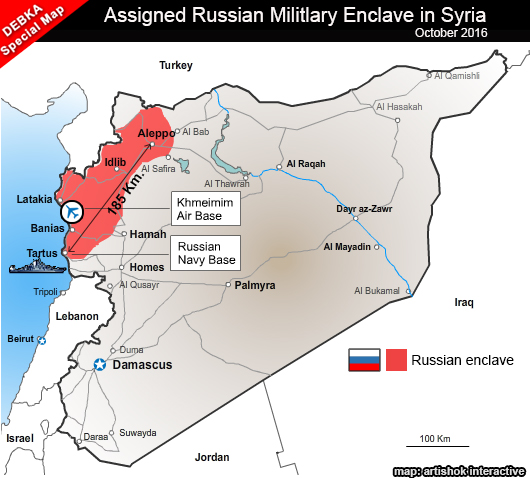How Far Will Obama and Putin Go in Their Duel over Syria?
The level of threats from Moscow rose to a strident pitch this week, hardly matched by Washington.
Russian Deputy Foreign Minister Sergei Ryabkov warned Monday, Oct. 3. that Russia and the United States “would completely part ways” if Washington’s plans include “reformatting the Syrian political landscape.”
His boss, President Vladimir Putin, threatened President Barack Obama Sunday with “repercussions across the Middle East” if US jets attack Syrian forces fighting to recapture areas of Aleppo in rebel hands.
His foreign affairs spokesperson Maria Zakharova spoke of “terrible, tectonic consequences” if the US intervened against the Syrian army, “not only in the territory of this country but the region as a whole.”
And on Monday, Oct. 3, Putin signed a decree for Russia’s withdrawal from the plutonium disposal treaty, implying that the entire nuclear disarmament frameworks that followed the ending of the Cold War were open to revision.
Putin blamed his decree on “The radically changed environment and threat to strategic stability posed by hostile US actions against Russia.”
After yet another Aleppo hospital was struck by Syrian jets, Washington, accusing Russia of a role in the mounting horrors, suspended talks on Syria with Moscow. There were also hints of counteraction – and even possible military action – on the way,
In this increasingly confused climate, the storm of Kremlin threats appears to have been galvanized by evaluations submitted by the two Russians secret services, GRU and SVR, that the United States was indeed on the point of launching air and cruise missile strikes against the Syrian army divisions advancing on Aleppo, Syria’s second city after Damascus.
Such US strikes could not avoid hitting the Iranian and Hizballah forces, the core of the Syrian offensive for dislodging the Syrian rebels holding onto the northeastern districts of the city.
According to the intelligence briefing they put before Putin, the Americans would not be content with a single strike but go for a systematic round of attacks in order to attain three objectives:
1. To cut short the Russian-backed Syrian-Iranian-Hizballah assault on rebel strongholds in Aleppo.
2. To open the way for the passage of vital food, water and medicines to the direly distressed population.
3. To force the Russians to return to the negotiating table.
Nonetheless, Obama has so far held back from ordering American bombers or cruise missiles to go on the offensive against the Syrian army.
One deterrent appears to be the presence of advanced Russian S-300 and S-400 air defense missiles in land bases in Syria and the C-300 and SA-10 Grumble missiles parked on the decks of the Moskva cruiser, which is already in position for waylaying US bombers and missiles.
Should one of the land-based missiles shoot down an American plane, Moscow could claim it was the work of Syria air defenses, which, too, are armed with advanced Russian anti-air missiles. As for the latter, officials say the Russian Grumbles had the potential for countering any American cruise missile attack in Syria.
On Monday, Oct. 3, furthermore, Russia was revealed to have sent to Syria for the first time advanced SA-23 Gladiator anti-missile and anti-aircraft system, components of which were unloaded at the Russian naval facility of Tartus last weekend.
But, according to DEBKA Weekly’s Washington sources, Obama is holding back from a direct military showdown with Russia over Syria – not just because of Russia’s massive, lethal missile buildup, but for an additional reason: Information reaching US intelligence indicates that once the Assad regime has recovered Aleppo from the rebels – and limited its campaign to the furthest target of Idlib – Putin has no intention of being dragged into any further military involvement in Syria, excepting only as guardian of Russia’s strategic assets there.
If that turns out to be the case, it is a situation that Obama may decide he can live with, while at the same time continuing to hurl verbal abuse for the Russian role in Syria.
Moscow has little faith in the capability of the Syrian army, or what is left of it – roughly 20,000 troops including Hizballah – to win any more battles.
Therefore, in the coming stage of the Syrian war, Russia is expected to switch its focus to shoring up a 85km long stretch of Syria’s Mediterranean coast from Latakia to Tartus, which is up to 180km deep (Latakia to Aleppo) in some places and 340km (Latakia to Palmyra) in others. (See attached map.)
Russia’s former Air Force commander Pyutr Deinekin hinted as much on Sept. 29, when, speaking of the command structure for military operations in Syria, he advised building “a well developed network of airfields as the key to infrastructure on the ground,” adding: “The command requires at least two combat-ready airfields for maneuvering.”


